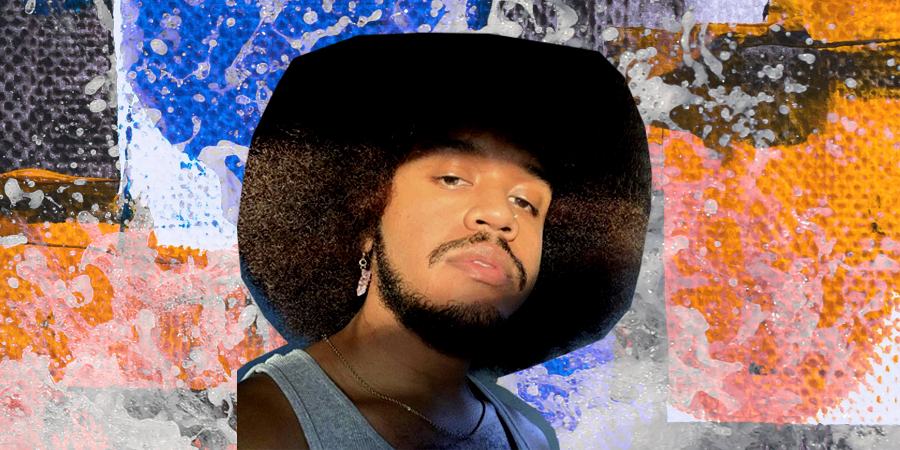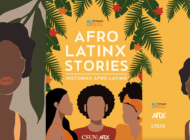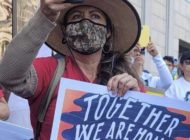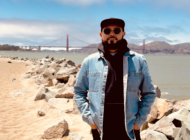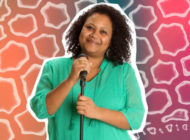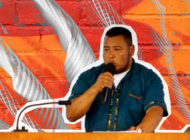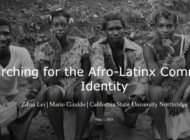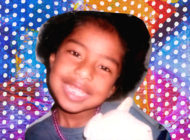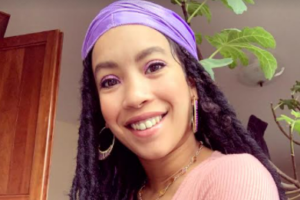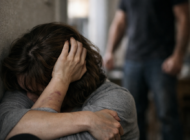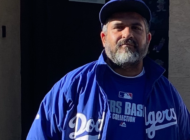In this episode, Diana Romero talks to Demetrius Dante Taylor Sánchez Jr., who grew up in Arizona from an African-American family from Mississipi and a Mexican Mormon family from Coahuila.
By DIANA ROMERO
EL NUEVO SOL
Diana Romero: Welcome to Radio Nepantla, a podcast by El Nuevo Sol, the multimedia site for the Spanish-language journalism program at California State University at Northridge. My name is Diana Romero. The title of this series is Afro-Latinx. We want to tell here diverse stories of Afro-Latinx, Black-Latinx, and Afro-Latin American identity. According to the Pew Hispanic Center, one out of every four Latinos in the nation identify as Afro-Latinx. This is the same proportion of Afro-Latin Americans in that region. We decided to use the term Afro-Latinx—with X—to be inclusive of non-binary people. The umbrella term “Black-Latinx” refers to biracial people with one African-American and one Latinx parent. The umbrella term “Afro-Latin American” refers to people of African ancestry in Latin America.
In this episode, I interviewed Demetrius Dante Taylor Sánchez Jr., an Afro-Latinx. Demetrius and I were able to discuss many topics.One topic was where he grew up. Demetrius is the middle child with two sisters. His father’s family migrated to Las Vegas from Mississippi. His mother was born in Piedras Negras, Coahuila Mexico and eventually moved to Arizona where both parents eventually met.
He grew up in Mesa, Arizona—where life wasn’t so easy for him.
Demetrius Dante Taylor Sánchez Jr.: This area is considered the East Valley. Growing up in the East Valley it is very racist. We grew up in a predominantly Mormon and Mexican area, so it was just a lot of people who were dreamers you know, they were undocumented. A lot of people who are within the church and we kind of were split in the middle. My family was Mexican Mormon which is kind of unheard of, not a lot of people have heard it. Yeah it was an interesting area to grow up in for sure.
Diana Romero: At a young age, Demetrius knew that being bi-racial was tough. He tells me some experiences he has had to deal with within his family and also the community.
Demetrius Dante Taylor Sánchez Jr.: I mean at a very young age, it was, even within our household, you know my mom marrying someone who was Black, it was very like “what?!… and I love my people, but they don’t love me. At least that’s what I’ve experienced. Growing up it was always, “you’re more Mexican than you’re Black,” you know? There was always something being said about our hair, our skin—little microaggressions. Or even just flat out still being racist and then just living your growing up in a predominantly White and Mexican area was very like just… it was known like, “hey you know you’re Black”—and people are going to let you know. But then they would hear us speak Spanish and then they were like, “wait, so, then you’re Dominican? You’re Puerto Rican?”
“No, I’m Black and Mexican.”
“But you look Black.” It just was very… we kind of grew up with a complex because we knew we were Black but we weren’t really familiar with that side.
Diana Romero: Demetrius’s parents divorced, so he spent his early years with his mom’s side of the family. He goes on to explain that it wasn’t until his pre-teens that he started to hang around more with Black people who encouraged Demetrius to love both sides of himself.
Demetrius Dante Taylor Sánchez Jr.: My parents had divorced, so my Black side was in Vegas, and we grew up with our Mexican side. We grew up with a complex, we didn’t really know who we were not until we kind of got into middle school and we met more people who were Black and they were like, “no, your Black is beautiful,” you know, “yes—you’re Latino but like people will see you as this” and, like “just know it’s beautiful.”
Diana Romero: He often visited his dad in Las Vegas where even there he faced some challenges. He talks about how within the Black community, there are things that make him feel like he wasn’t Black enough.
Demetrius Dante Taylor Sánchez Jr.: Within the Black community there’s colorism, so there’s just racism… it’s just ridiculous. It was very “oh, you guys are light skinned,” you know? “You’re not really Black.” Or, you know, “you guys have good hair.” Or, you know, “you guys enunciate and you speak proper.” So, it was just very—“we weren’t Black enough.” So it’s really hard because we’d go to our Mexican side, and we’re like “oh,” you know, like “this is what we grew up with; this is what we love,” but it was always—we were reminded, “but you don’t look like us.” And then you go to the Black side and it’s like, “well, you don’t look completely, like us.” But yeah, so definitely like, even just growing up with, you know, my dad it was very just a lot of microaggressions from him, not so much my mom—my mom was very much very supportive. She made sure we knew about our history and our culture on both sides.
Diana Romero: Demetrius didn’t just try to assimilate to his own two cultures. Arizona neighbors the state of Utah, the headquarters of the Mormon religion. He tells me how he tried to be part of the Mormon church, before his mother took him and his siblings out.
Demetrius Dante Taylor Sánchez Jr.: I was like “oh, you know what let me, let me try to incorporate myself into that culture.” And I remember it was when my sister and I were—my older sister, we tried to incorporate ourselves into the Mormon culture. And my mom—we were about to get baptized. She was like “no”… And if she wouldn’t have pulled us out when she did—I remember, we were so distraught like what we’re seeing, like all of your friends that you grew up with in our family and our cousins be a part of that culture. And being like kind of not allowed to do that, we were just like “why?” Like “why?”—that’s so messed up, you know? But I’m so glad because they may—they 100 percent when we tried to was like “your Black.” “Mexicans”—like it was just things that they would say like, “oh don’t Mexicans all live together in one house.” And “oh, Black people in this—and that”… Even when we tried it was like you’re still not enough so like that was when it was like no like I should be proud of you know, who I am and, like my unique situation so.
Diana Romero: He recalls that it was mostly his aunts and uncles who were trying to implement the Mormon faith onto him. But he’s grateful that his mom was able to take him out of it.
Demetrius Dante Taylor Sánchez Jr.: I mean I think it was just them just trying to force feed it onto us as a way of “right of passage” because we never really fit in. So that’s probably why we were like “okay we got to do this.” She just couldn’t deal with how close minded that religion is. And so, she was definitely the black sheep of the family, and just was like no like I want you guys, to be more than that, and to expand your minds so.
Diana Romero: Demetrius is a gay Afro-Latino. He talked about being a triple minority, and how him coming out during high school was most likely the reason why his family pushed Mormonism on him.
Demetrius Dante Taylor Sánchez Jr.: I came out when I was younger. So being gay, Black, Mexican—and I have struggles, with it. I feel like that’s something important and something that I always touch on. It’s just that both cultures are super machismo. And so it was always just like even within the gay community, it was like, “oh, you know you’re Black and Mexican?” Like, “no—we don’t want you.” Then you go to your culture and they’re like “no, but you’re gay.” So it was very like—messed with my head, you know very like, “whoa.” So, I really had to really like I guess build a family—find my family by myself. Yes, I find my culture to be super beautiful and very just like uplifting—it has its faults, on both ends. Yeah that’s kind of been a big part of my life also. Because it was almost like I’m a triple minority, so yeah. And I think that’s one of the reasons why I felt like my family tried to push Mormonism down our throats because they could see it, but we didn’t know.
Diana Romero: Despite the visible hate that Demetrius received from his family over being one of the other race as well as being openly gay, he never stopped getting support from his mother.
Demetrius Dante Taylor Sánchez Jr.: She’s always been super supportive, like what did you do to deserve this woman? She was like “oh, I could tell—when you were younger.” And I was like “what?” I like, she’s like “yeah.” She took a trip to New York when I… I was like 10, or maybe eight or something, I remember we’re little, and she took this picture of a billboard and it was like, “how to know your son is gay, how to support him.” And I remember, like, when I came out, the night I came out to her, she showed me that picture. She’s like, “I took that picture like 10 years ago.” And I looked at her… So, yeah it was like super sweet. I was like, “oh my God,” like a fucking mess, but yeah.
Diana Romero: Demetrius’s mom was more open-minded and it led him to be who he wanted to be.
Demetrius Dante Taylor Sánchez Jr: Yeah, she’s 100 percent I would say, like the support. How I’ve been able to get through all of this. Learning who I was, giving me the space to express—incorporating art. Art is such a big pillar within our—both within the Black community and the Mexican community, or should you say the Latin community. And just her really like just giving us that free range—forever grateful.
Diana Romero: Growing up in a predominantly White and Mexican neighborhood, Demetrius was someone who didn’t fit the physical characteristics of others. His hair was, and still is, something that others were not accustomed to seeing often. He tells me some of his experiences he’s had to deal with because of his hair.
Demetius: One hundred percent, when I was younger, growing up in Mesa, it would be in school.. kids would just like put their hands on my hair during assemblies and i’m like “what the heck?” I’d like leave and there’d be stuffing my hair, and I’m just like “why can’t I just be me?” like, “why is it so offensive to you guys that are just existing?” I’d even be walking home from school in Mesa and it was pretty common but there was a lot of confederates that lived in the area, and a lot of Neo-Nazis and racists. I’d be walking home from school and I made sure to have my earphones in, but I would just be called the N-word, out of a window—multiple times. It sucks but it just kind of—It made me stronger, because I was just like “damn like me walking on the sidewalk just minding my business, like I’m not even doing anything this offends you?” To this day, even my grandfather like he’s from Linares, is from like deep in Mexico. And he, like, will always just say like very micro-aggressive stuff. My mom had to step in at one point like “that’s not okay, it’s really hurtful you saying that stuff to you know your grandson.” It was always “oh your hair’s so ugly you need to cut it. I like it when it’s shorter.”
Diana Romero: Despite all of the racist remarks he would get from his family and others in his environment, he always wanted to make sure that he kept his hair natural so that younger kids, who may feel the same way he does, would see him and feel less afraid to be themselves.
Demetrius Dante Taylor Sánchez Jr.: Because when I was younger I didn’t really have control of how I wanted my hair. And also because I didn’t see older people, or people that were like me, with my hair. I was like I want to be that person for that 10-year-old me that looks and sees that there’s somebody that is killing it in their job or their profession or whatever it may be, and they look like me.
Diana Romero: Although he wants to inspire young people to love and appreciate their natural hair, Demetrius talks about his negative experience with having his natural hair in his work setting.
Demetrius Dante Taylor Sánchez Jr.: It was actually pretty difficult working in the LA market job market. I was a recruiter in Beverly Hills, I worked in West Hollywood and pretty uppity areas. I got a promotion dangled in front of me, and it was like “well, you need to cut your hair, you know it’s just it’s the clients aren’t going to take you seriously.” and I like looked at her, and I was like.”I just got a haircut,” and she was like “Oh well, it’s still not going to cut it,” Still till this day, like, I still hear things it’s very sensitive subject for me, but like that’s why rebel and it’s like you know I know it’s important for me to be out there and be seen and. No matter whatever names and fucking things people are going to call me I’m just like if that offends you’d me just being mean whatever.
Diana Romero: Demetrius lived in Los Angeles before the CoronaVirus Pandemic hit. He had to move back home to Arizona, where he says the environment is getting better for him.
Demetrius Dante Taylor Sánchez Jr.: I’m noticing, it is getting a little bit more liberal. It’s weird and like certain areas I feel more comfortable seeing like “okay there’s Latinos, right I’m cool, Okay there’s Black people, okay I’m cool.”
Diana Romero: There are still some places in Arizona where he notices he gets stared a lot because the demographics are predominantly White.
Demetrius Dante Taylor Sánchez Jr.: I hate Scottsdale. Scottsdale would be considered like Beverly Hills area West Hollywood, predominantly White people with money. Very flashy. When I went with my cousin she and I got a gift card from our boss. She loves that area, but she’s Mexican and Filipino so she just looks Latina. But I wore my hair out, and it was like people were like staring and pointing and like taking pictures and I was like “Okay I’m back in Arizona.” It can be overwhelming, but at the same time, like I do it, because then they get those people who are like “hey I just want to let you know, like, I really appreciate you wearing your hair out,” and like I have Black people, or Afro Latinos whatever they are, come up to me and they’ll like “yo like I wouldn’t have the balls to do that out here.” So it’s very liberating, like a double edged sword sometimes.
Diana Romero: Demetrius continues to have a positive outlook on everything he went through.
Demetrius Dante Taylor Sánchez Jr.: It honestly shaped us into the people who we are now and you know, growing up—being Black and Mexican—it just showed us that we just have just so much culture and so much, just, fucking richness within our background. And a lot of people like, “well, you have to choose”—no, I don’t, because this is who I am. The both of them are who I am. And this is what makes us, us.
Diana Romero: Thanks for listening to Radio Nepantla: La Voz que Traspasa Fronteras. We invite you to listen to the rest of the series Afrolatinx. We will tell you stories of Afro-Latinx identity. Listen to our podcast on your favorite platform. You can also check our SoundCloud channel-ElNuevoSol-or our website: ElNuevoSol dot net. This was a production of El Nuevo Sol–the multimedia project of the Spanish-Language Journalism program at Cal State University, Northridge. This episode was produced and edited by: Diana Romero. Voices: Diana Romero and Demetrius Dante Taylor Sánchez Jr. Music by the Afro-Colombian group Kombilesa Mi. See you next time.
Tags: #AFLX Afro-Latinx Black Mexican Demetrius Dante Taylor Sánchez Jr. Diana Romero LGBTQ podcast Radio Nepantla






